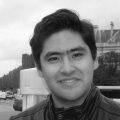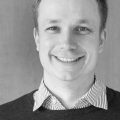
In the new “smart” age of information technologies, the advent of integral design-to production workflows is revolutionizing the way man-made constructions are designed and built. While continuous efforts for the automation of construction processes are progressively eliminating materialization constraints of what can be built regardless its geometry, the current environmental crisis derived from our constructions open a debate about what worth to be build. Such evident necessity for a better architectural design practice based on the optimization of resources has brought a revitalized interest on the study of innovative lightweight structures where form and performance capacities are inevitably associated. The systematize use of elastic deformations on structural elements like beams or plates, known as active bending, provides a novel source for innovations in this realm. Bending-active structures are extremely lightweight constructs allowing to develop highly complex geometric shapes from the combination of rather simple and planar elements. Such constituents can even be tensile elements like cable or textile membranes, to generate a more robust hybrid construct with improved functionalities and performative capacities. These structural systems open the door for new types of freeform constructions with minimum footprint in our environment and more efficient functional capabilities. However, the problem of designing such structures relies on the unpredictability of its final geometric shape due to the interdependence between the form and the forces acting on the structure. A paradigm shift in the way we, as architects and engineers, design our structures is therefore required that implies a transition from conventional geometrical representations to material-based procedures by means of physical and digital models.
The IAAC Global Summer in Quito will focus on the ongoing research conducted at the Institute for Building Structures and Structural Design (ITKE) regarding the conceptual design of lightweight structures that integrates bending- and tensile form-active elements. The workshop will focus on the exploration of different design modes and form-finding approaches for non-standard articulations of form-and bending-active elements when shaping a structural system. The program will investigate the implications of using highly interactive and intuitive design spaces for computational and analogue form-finding, and the potential use of local natural materials. The final goal is to build a large-scale demonstrator where design and materialization will be carried through advance physically-based modelling techniques and digital fabrication protocols. The workshop aims to open a discussion regarding lightweight structures and its role in the sustainable development of our building environment.
IAAC Global Summer School is a full-time two weeks course, 1-14 July 2019, that provides both practical and theoretical knowledge. The program is led by expert tutors, combined with lectures by renowned professionals and academics relevant to the topics to be treated during the course. These will be broadcasted in the different node-cities, all globally connected. Participants will join a global agenda and an international laboratory at their disposal to test their design hypothesis, understanding how design conclusions derived locally can be tested and evolved globally in the different cities where other teams reside.
During the workshop, intensive tutorials and evening lectures will be organized to introduce students to model and computational design thinking methodologies, as well as techniques for physical form-finding by tutors from leading design research programs IAAC, ITKE/Uni-Stuttgart, and professionals from the field of architecture and engineering.
Introductory sessions are going to be organized for participants in topics ranging from parametric and associative modelling in Rhino/Grasshopper to prototyping and electronics with Arduino. Students will acquire basic knowledge and understanding of flexible structures and dynamic methods for form-finding through theoretical and practical scripting sessions. The core of the workshop is the study and implementation of highly intuitive and interactive form-finding processes for the design of final demonstrator. Additionally, students will build in parallel small-scale models for comparing and validating numerical simulations.
The workshop will end with the design and fabrication of a 1:1 site-specific lightweight structure that will be produced and assembled by using a combination of analogue and numerical techniques. The goal of the workshop is to hold an open discussion regarding adaptive structures and its role in the sustainable development of our building environment.

Seiichi Suzuki is a research associate and doctoral candidate at the Institute of Building Structures and Structural Design (ITKE) at the University of Stuttgart. His work is focused on the development of advanced numerical form-finding strategies for enhancing user-model interactions while extending the design space freedom of lightweight structures. He is a licensed architect that holds a master’s degree in advanced architecture from the Institute for Advanced Architecture of Catalonia (IAAC, Barcelona) and a master’s degree in advanced design and Digital Architecture from the Pompeu Fabra University (UPF, Barcelona). He is teaching within the Integrative Technologies and Architectural Design Research (ITECH) Master Program and worked as a tutor at the Architectural Association Visiting School. His work has been published widely in international journals and conferences.

Valentin Koslowski is a Research Associate and doctoral candidate at the ITKE Institute of Building Structures and Structural Design, University of Stuttgart. He holds a M.Sc. in civil engineering from the Technical University in Munich and a B.Eng. from the University of Applied Sciences Biberach. Valentin’s research is on fibre composites design strategies for architectural applications with focus on the engineering and simulation of irregular composite grid shell structures and load-path adapted fibre layups as building structures. He teaches courses on modelling and simulation to influence the early architectural design process since 2014. Valentin worked in interdisciplinary teams with architects and biologists on internationally published and built projects, such as the Elytra Pavilion London 2016, and gave invited lectures in Europe and USA.
Ecuadorian’s biodiversity, the highest per square kilometer in the world, is an exceptional source of inspiration for exploring novel structural systems that self-regulate and coexist with natural environments. Such conditions offer a unique opportunity to break standard typologies and investigate novel structural system matching different architectural requirements through new forms of interaction within the design process.
All the lectures and seminars are going to be hosted at the Pontifical Catholic University of Ecuador (PUCE), one of the most prestigious universities and also the oldest private university in Ecuador.
The FabLab Zoi will be one of the main hosts of the workshop and the final prototype will be be exhibited at the Interactive Museum of Science (MIC). All the locations are distributed around the central area of Quito, the capital of Ecuador.
IAAC GSS is open to creative and innovative people who are interested in fields such as architecture, urban planning, digital fabrication, design, etc., searching for a multidisciplinary experience in an international environment. No previous skills are required, although CAD design, programming and digital fabrication skills are welcome. The official language of the course is English.
After the course, the participants will have gained theoretical and applicative knowledge about advanced design strategies. They will be familiar with parametric software, data visualization and use of digital machines. The last day of course participants will join a presentation of developed projects reviewed by a renown jury and will receive a Global Summer School Diploma.
Each participant is responsible to investigate which documents are required via the embassies in their country of origin. The school will provide a confirmation letter regarding the participation to the course, and will assist where possible the visa process.
Fee for Quito is 850 USD and includes all material costs needed for the course. No additional registration fee is required. Flight tickets, accommodation and food are not included in the fee. Each participant should bring his/her own computer with the software installed. Further details about the software will be given to the participants upon acceptance.
In order to register to the Global Summer School, participants need to submit the online application form, where they will be asked to fill their personal details and to upload a CV. Portfolio is not required. GSS18 dates are from 1-14 of July 2019 and applications are open until May 2019.
For more information email: [email protected]
